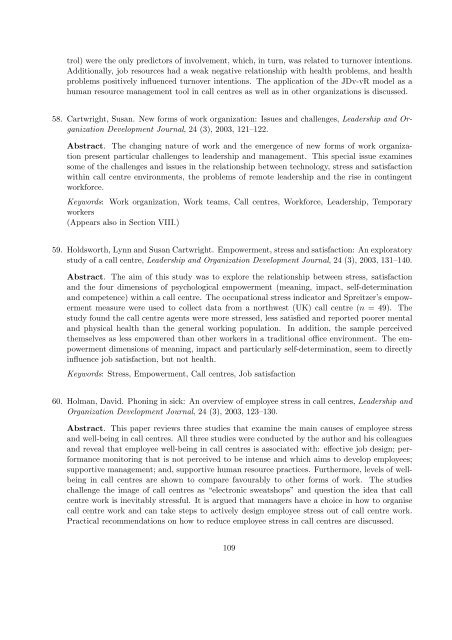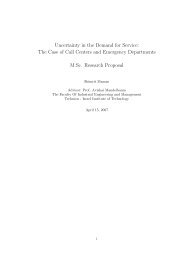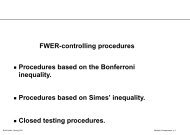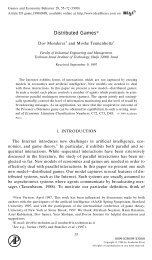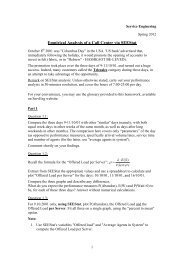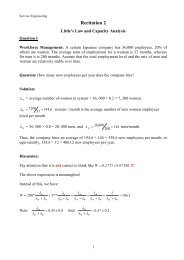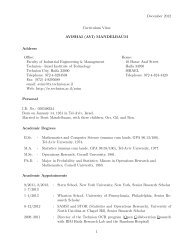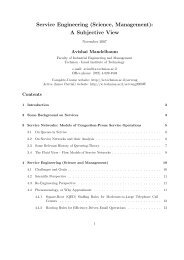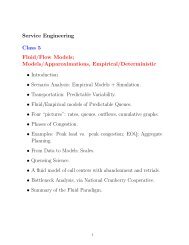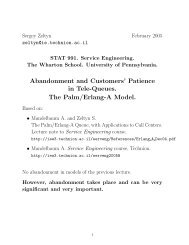CALL CENTERS (CENTRES) - Faculty of Industrial Engineering and ...
CALL CENTERS (CENTRES) - Faculty of Industrial Engineering and ...
CALL CENTERS (CENTRES) - Faculty of Industrial Engineering and ...
Create successful ePaper yourself
Turn your PDF publications into a flip-book with our unique Google optimized e-Paper software.
trol) were the only predictors <strong>of</strong> involvement, which, in turn, was related to turnover intentions.<br />
Additionally, job resources had a weak negative relationship with health problems, <strong>and</strong> health<br />
problems positively influenced turnover intentions. The application <strong>of</strong> the JDv-vR model as a<br />
human resource management tool in call centres as well as in other organizations is discussed.<br />
58. Cartwright, Susan. New forms <strong>of</strong> work organization: Issues <strong>and</strong> challenges, Leadership <strong>and</strong> Organization<br />
Development Journal, 24 (3), 2003, 121–122.<br />
Abstract. The changing nature <strong>of</strong> work <strong>and</strong> the emergence <strong>of</strong> new forms <strong>of</strong> work organization<br />
present particular challenges to leadership <strong>and</strong> management. This special issue examines<br />
some <strong>of</strong> the challenges <strong>and</strong> issues in the relationship between technology, stress <strong>and</strong> satisfaction<br />
within call centre environments, the problems <strong>of</strong> remote leadership <strong>and</strong> the rise in contingent<br />
workforce.<br />
Keywords: Work organization, Work teams, Call centres, Workforce, Leadership, Temporary<br />
workers<br />
(Appears also in Section VIII.)<br />
59. Holdsworth, Lynn <strong>and</strong> Susan Cartwright. Empowerment, stress <strong>and</strong> satisfaction: An exploratory<br />
study <strong>of</strong> a call centre, Leadership <strong>and</strong> Organization Development Journal, 24 (3), 2003, 131–140.<br />
Abstract. The aim <strong>of</strong> this study was to explore the relationship between stress, satisfaction<br />
<strong>and</strong> the four dimensions <strong>of</strong> psychological empowerment (meaning, impact, self-determination<br />
<strong>and</strong> competence) within a call centre. The occupational stress indicator <strong>and</strong> Spreitzer’s empowerment<br />
measure were used to collect data from a northwest (UK) call centre (n = 49). The<br />
study found the call centre agents were more stressed, less satisfied <strong>and</strong> reported poorer mental<br />
<strong>and</strong> physical health than the general working population. In addition, the sample perceived<br />
themselves as less empowered than other workers in a traditional <strong>of</strong>fice environment. The empowerment<br />
dimensions <strong>of</strong> meaning, impact <strong>and</strong> particularly self-determination, seem to directly<br />
influence job satisfaction, but not health.<br />
Keywords: Stress, Empowerment, Call centres, Job satisfaction<br />
60. Holman, David. Phoning in sick: An overview <strong>of</strong> employee stress in call centres, Leadership <strong>and</strong><br />
Organization Development Journal, 24 (3), 2003, 123–130.<br />
Abstract. This paper reviews three studies that examine the main causes <strong>of</strong> employee stress<br />
<strong>and</strong> well-being in call centres. All three studies were conducted by the author <strong>and</strong> his colleagues<br />
<strong>and</strong> reveal that employee well-being in call centres is associated with: effective job design; performance<br />
monitoring that is not perceived to be intense <strong>and</strong> which aims to develop employees;<br />
supportive management; <strong>and</strong>, supportive human resource practices. Furthermore, levels <strong>of</strong> wellbeing<br />
in call centres are shown to compare favourably to other forms <strong>of</strong> work. The studies<br />
challenge the image <strong>of</strong> call centres as “electronic sweatshops” <strong>and</strong> question the idea that call<br />
centre work is inevitably stressful. It is argued that managers have a choice in how to organise<br />
call centre work <strong>and</strong> can take steps to actively design employee stress out <strong>of</strong> call centre work.<br />
Practical recommendations on how to reduce employee stress in call centres are discussed.<br />
109


